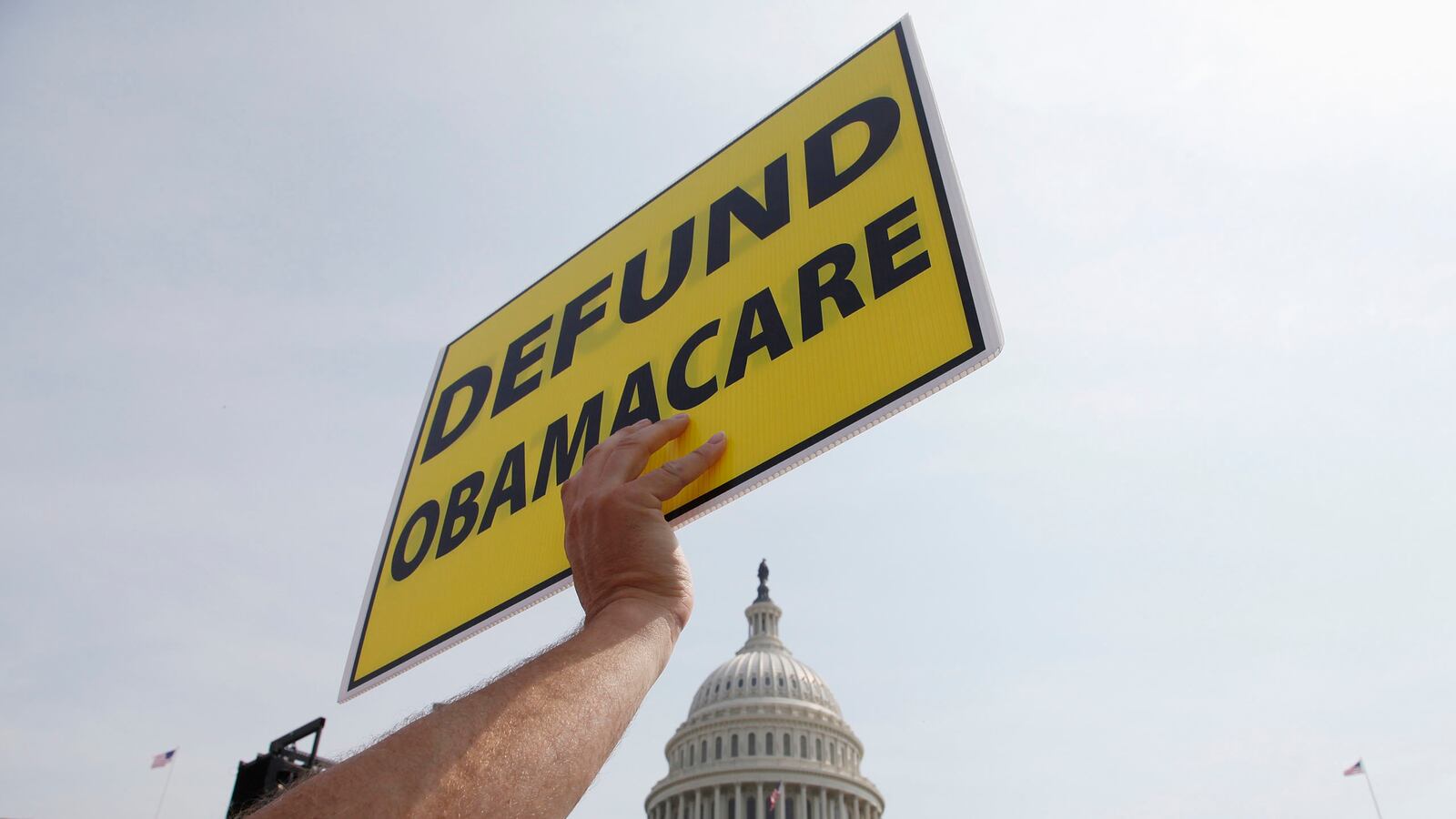With the predictability of Halloween decorations flooding your local CVS, the Tea Party is once again being pronounced dead. Unable to defund Obamacare, unhappy about funding the government, the far right’s nihilist wing has nowhere to go but the grave.

Or so we are told. But in a very seasonal irony, it won’t stay buried.
Why? Because the American people hunger for brains—the brains to realize that we need a new kind of bipartisanship.
Contrary to the hopes and dreams of its antagonists, the Tea Party doesn’t reduce to some throwback, obsolete prejudice. It can’t be dismissed as a set of bad people or ideas that will both be dead and gone in 15 years. The critics mistakenly think the Tea Party is trapped in the historical past. In fact, it’s a reaction to the possibility that history will trap us all, in a future where government rules every aspect of our lives.
To establishment Republicans and Democrats, that sounds like an absurdly narrow and implausible vision. But even though the Tea Party has an unpopular brand, Americans are in broad agreement with its basic insight that only radical reforms will do when it comes to fixing federal policy.
It’s a dynamic that reflects our frustration with the Tea Party even as it opens a way out of the impasse. Senator Ted Cruz’s efforts to sink Obamacare exacerbated the predictable party-line conflict Americans despise. But Senator Rand Paul did the opposite with his anti-drone filibuster. He positioned the Tea Party to resonate not only with a wide segment of voters, but with the further-left Democrats who chafe under their own party establishment in Congress and the White House.
Today, Americans roll their eyes at Tea Partiers in the House of Representatives foolish enough to think they could singlehandedly force a default on Wall Street and the White House. But some Americans were thrilled when Tea Party Rep. Justin Amash almost led the House to defund the NSA’s endless harvest of our personal data. Instead of driving the hatred deeper between right and left, Amash brought factions together. Only this time, establishment bipartisans faced an equally bipartisan opposition: radical Republicans and Democrats long forced to the margins of their parties.
That’s right—at the national level, when the Tea Party links up with fellow radicals on the left, they capture the imagination of a constituency large enough to make a real difference. When they don’t, they don’t.
This is freaking out some protest-minded progressives. At Salon, Tom Watson argues that collaborating with libertarians against the security state is a moral and political loser for the radical left. Never mind the prospects for real, durable change—Watson fears that any coalition of the radicals will confer legitimacy on crackpots and take liberals’s eyes off the ball of social justice.
But the fact is, the left has been suppressed by its own party. And even if that changes after Obama leaves office, the same predicament that faces the Tea Party awaits: reform-minded progressives just don’t have the votes to do anything but disrupt the business of Congress.
Like the Tea Party, they need the power to transform it—not in the sweeping, comprehensive manner of revolutionaries, but in the pragmatic, ad hoc fashion of successful reformers. And like the Tea Party, they need to take their allies as they find them.
Set ego and ideology aside, and it’s possible to gratify America’s hunger for radical reform. On national security, radicals offer, and Americans want, a rollback of the surveillance state and a transparent restoration of the rule of law. On the economy, radicals offer, and Americans want, banks that aren’t more powerful and centralized today than they were before the financial crisis. On the drug war and criminal justice, radicals offer, and Americans want, an end to no-knock raids, warrantless searches, and a wealthy and soulless prison-industrial complex.
The list goes on. Americans want to break the culture of Beltway lobbying, which will only happen when lobbyists give up on trying to own radical representatives beholden only to their conscience and their constituents. Ruthless, repeated gerrymandering has made a mockery of voting—not because “extremists” have captured the parties, but because mainstream party machines have colluded to game the system. Radicals right and left can end that, too.
Even Obamacare draws radicals together on some level: right and left, they both understand that federally cartelizing corporate health insurance is not, in any enduring sense, the path forward.
Tea Partiers like Paul and Amash seem to understand what’s at stake. Figures like Ted Cruz and Sarah Palin don’t. As the radical right sizes up its options going forward, the choice will be clear. The Tea Party can survive and thrive only by going bipartisan.
Radicals on the left should welcome them—not as heroes or BFFs, but as fellow citizens, who in spite of it all do share some interests and dreams.
If that attitude doesn’t prevail, mainstream Republicans and Democrats will keep delivering the worst of both worlds, attacking each other one minute, avoiding responsibility for their failed policies the next. That’s why Congress and both parties have record or near-record low approval ratings.
Without a radical renewal of political partnership, our crisis of legitimacy in Washington will deepen further still.
With it, we can help salve the seething anger that the fearful mainstream senses in the streets. Instead of Confederate flags and Guy Fawkes masks, we’ll get the hard work of deliberative democracy. Rather than revolutionaries convinced they control our destiny, our radical bipartisans will understand their mission of reform can only go so far as they can earn trust and agreement.
In that kind of climate, the cynical hatred and sarcastic contempt that rules our political hearts will soften into something that can approach a new neighborliness. Instead of eyeing the ideological other like a mortal enemy more deserving of humiliation than representation, we can admit that focused, sound governance comes from focused, sound coalitions. America won’t become a utopia overnight—or ever. But with a bipartisan alliance of radicals in Washington, the logjam of political dysfunction will finally be broken.
How’s that for a party?





